Japan: a country of such common sense that in some places it is irrational

From the moment you have an anime girlfriend, you only hear about Japan. What are all weird there. How cool it is. How to kill you for an impolite word. And so on. For me it was always a ninja, samurai, yakuza, anime, the goddess Canon for the camera, electronics, sushi and tentacles. I think you can continue the list.
On the spot it turned out that all this is, but this is not the main thing. These are just trifles. The main thing is that if we ever build space cities, I know who will do the best. Because Japan is now a very technological and at the same time very green country. In one of the most technologically advanced cities in the world, they managed to write beauty into every little thing and preserve the feeling that you are in nature. And manage resources as efficiently as possible, including garbage. And at the same time, they are not bothered by the incompleteness and imperfection of the world around us - we only have beauty in its final state, and they also have it in the process. That is, all the time.
And all this fierce crap that you heard about the country actually logically follows from the premises that are in the basic cultural code. I'll tell you now.
Tongue
The Japanese write in hieroglyphs (this is a fork of the Chinese system) and two syllabic alphabets: hiragana (hirokana) for their incomprehensible words, and katakana for borrowed words. Plus they occasionally use transliteration, about as often as we do. The syllabic alphabet immediately imposes a unique connotation on imported foreign words. The fact is that there are syllables there, and apart from syllables there is nothing there. Conditionally, imagine that you have all the necessary consonants, but strictly in combination with some vowels. Therefore, the light will be "wright." And, yes, the letters “l” and “p” are one and the same (“the train goes along the rails”), “c” and “b”, and also “w” and “c”. This wild holivar about sushi or sushi was decided on the spot after the very first dialogues. They pronounce both letters - “c” and “w” - but multiplex them along the wavelength. Something similar happens with the sound "u", but not so pronounced.
As a result, the beautiful Slavic name Svetlana = Subetoran.
Therefore, the entry barrier to language learning is large. Fortunately, when you manage to overcome it, that is, start writing in a foreign language, then it’s easy. They repeat sounds perfectly, and many know English very cool. That is, you will meet either those who will be very difficult to understand because of the accent, or those who will speak very cleanly.
Geography
According to this Japanese-centered map of the world, it may seem that there is only one climatic zone:
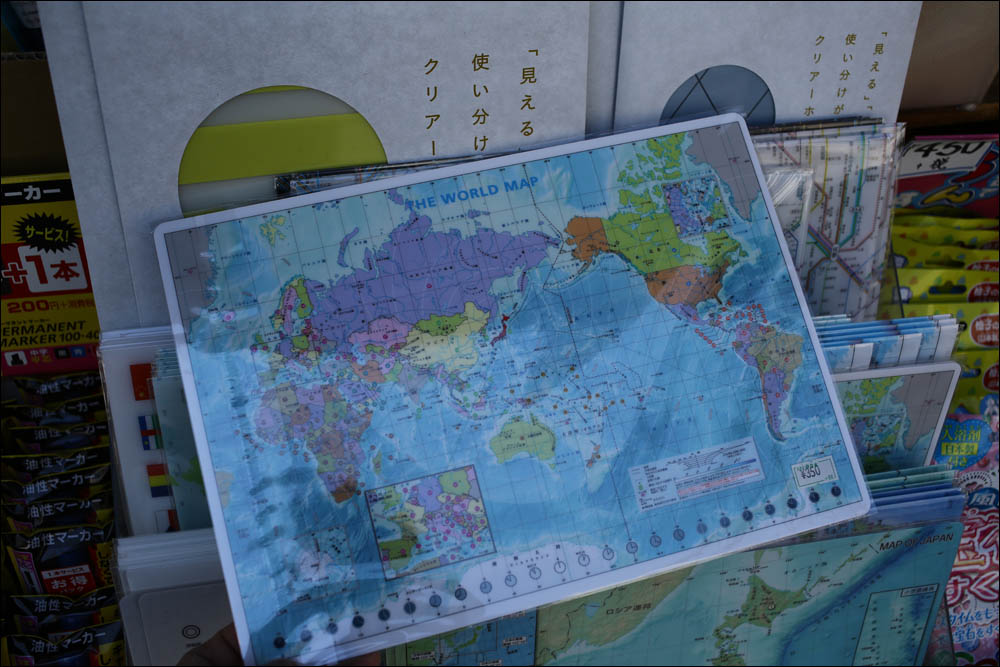
In fact, the northern edge of the country is close to our Yuzhno-Sakhalinsk, and the southern one is already in a tropical climate with islands like in the Philippines. But the warm current nearby makes the climate of the northern part of the country quite warm. A logical consequence - almost throughout the country, low-rise residential buildings are built from sticks, plastic and drywall so that you can knock on the wall and pierce it with your hand. That is, the temperature of the house corresponds to the street temperature.
Why? Because climate plus geological activity. Here, several plates are found at once, so the activity is very strong, and it shakes constantly. Of the six thousand islands of the country, some disappear, some appear. The constructions are made with this in mind: somewhere they are earthquake-resistant and expensive, and somewhere if the house is built on you, you will shake off and build a new one in two months. Heating, respectively, air conditioning. There are old gas stoves, but they are magical: after them you have to air them every couple of hours. The consequence - in winter they go in outerwear even at home.
Modern houses are already with underfloor heating. Because the main life goes on the floor - there they sleep and sit. Chairs came into use relatively recently by the standards of history. But in a traditional house they sleep, pupating to the fullest: a mattress, then a futon, then a plaid, then a Japanese, then again a plaid, and on top of a feather-bed.
The houses are light, so someone has long suggested building them on an air cushion. A seismic sensor, a battery - and when movers start from below, the house takes off. It seems like about a hundred houses have been set up like this .
Urbanism and nature
All major cities are green. Something like this was painted Wasteland 2 - as opposed to the scorched deserts of Fallout, there greens braided around the skyscrapers. Well, the apocalypse has not yet happened, but there is greenery.
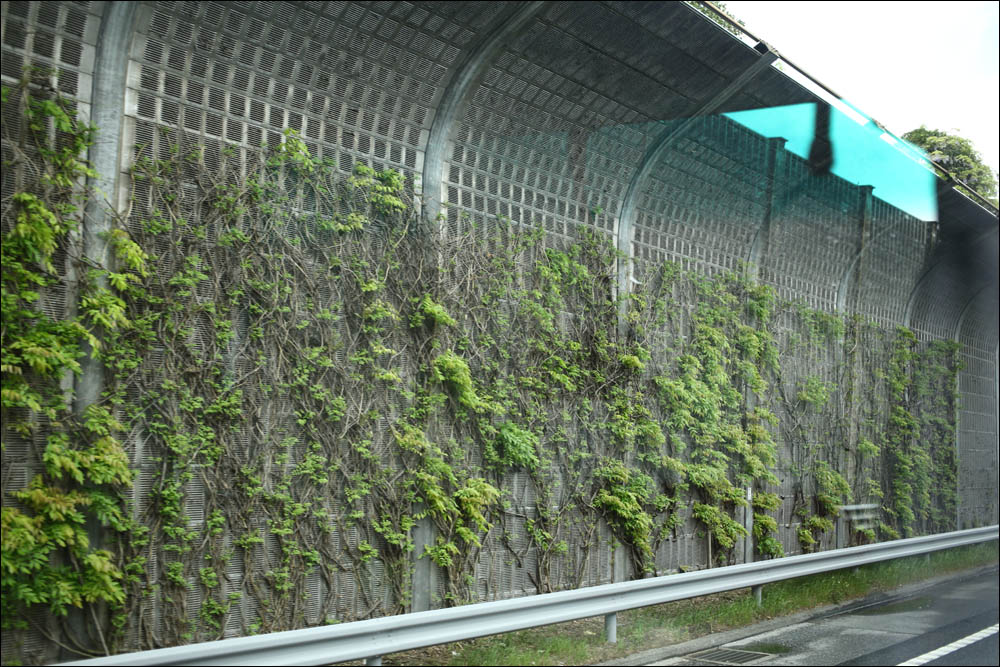

Buddha statue in Osaka, you need to make a wish and splash water on the statue. N years of iteration - and here we are.
Biology is very respected here. On the bill of 1,000 yen - the microbiologist Hideyo Noguchi . Coins in increasing order: cherry, rice, temple, chrysanthemum, sakura, paulownia + bamboo and mandarin.
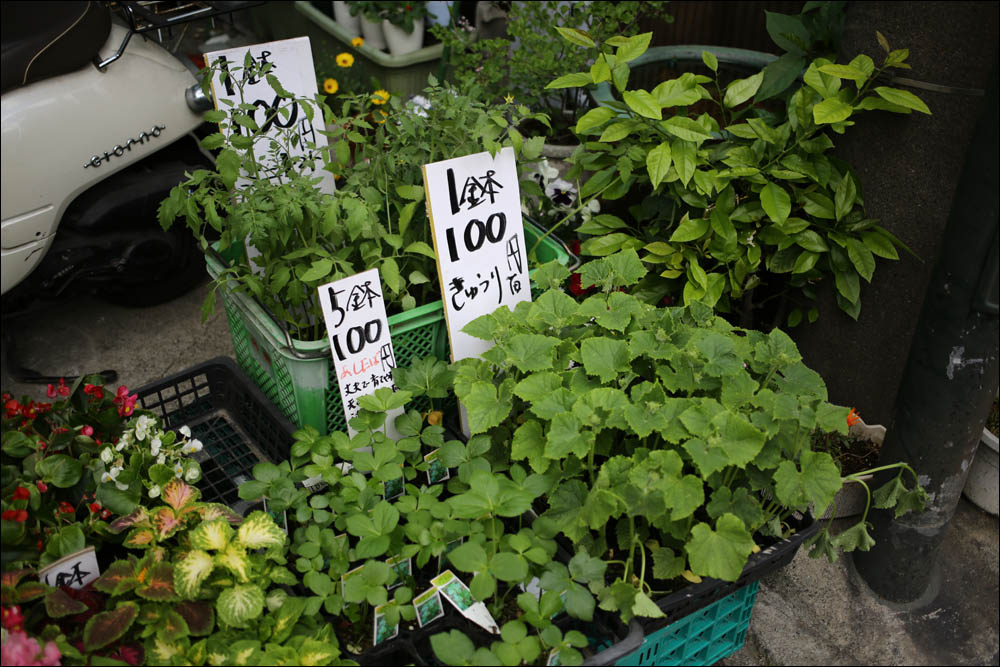
Shop on the street Osaka, everything is native.
In the center of the city almost everywhere there is a lot of greenery:
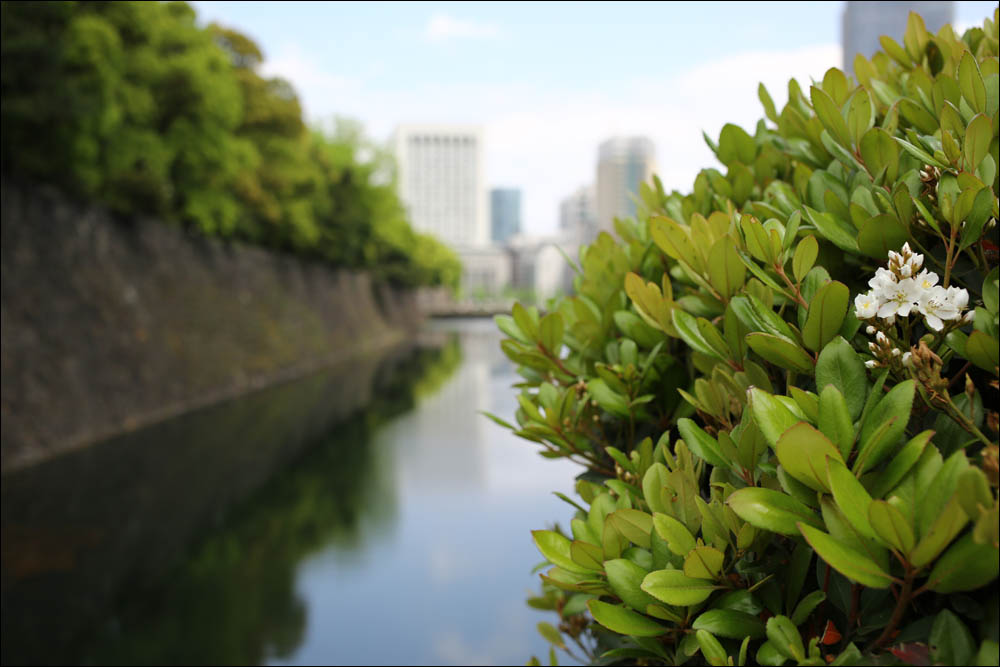
Behind the cities - all the land is used, there are simply no empty shreds. This is either land plants, or rice (like here), or a plant:

In the photo, by the way, an incinerator. More precisely, this is a very tricky thing, which went about 50 years ahead into the future from Moscow waste incineration plants. Garbage is sorted. Moreover, I got sick of dividing the bottle into three parts: the bottle itself, the lid and the etiquette for different garbage bins. After sorting, everything that can be recycled will be reused. What burns will be burned to generate electricity, and at temperatures when almost nothing will fly out of the pipe. Ashes will be compressed and used as building material (they have already built one island).
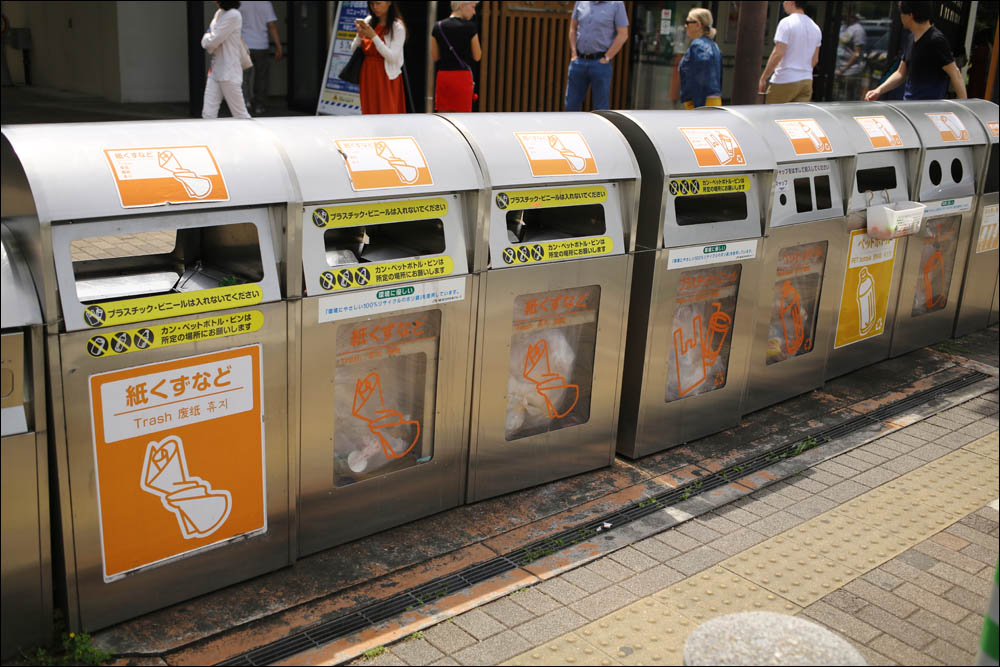
Household appliances must be returned to the store where you bought it, they will use it for money. Furniture can be given on request to a garbage truck. There are “happy days” when specific types of garbage are disposed of as scheduled.
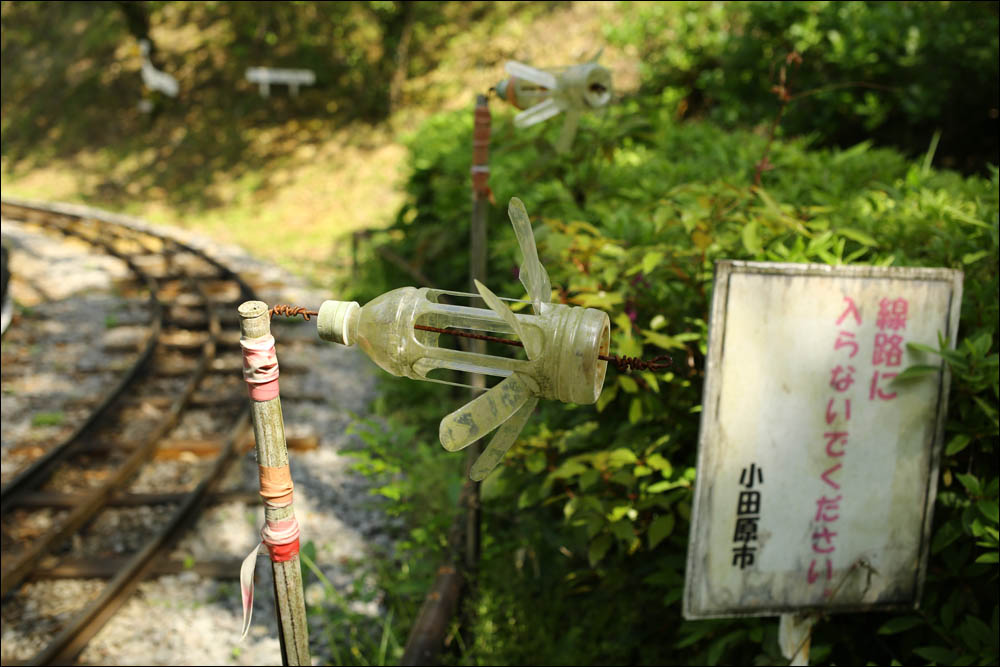
They even do the most terrible things beautifully and reuse something. This is a scarecrow for birds.
It doesn’t beat the tradition of packing everything several times and is insanely beautiful. Here, take a look:

Very touching: even when you buy yourself a boiled egg, it will be in a stunningly beautiful box, then you will be wrapped it a couple of times and put in a bag. With a cardboard at the bottom so that it does not lose shape. It all spends a lot of resources. Therefore, it is now decided that recycling is more than 90% more important, and if you can’t not litter, it’s better not to litter. Therefore, there is an institution “use the thing to the end”. This is combined with a cultural code. Here is the school uniform. It is sewn to order, and there are special threads that must be pulled out and torn so that the shape grows and grows with the child. If a little underpay for the uniform, or if the child is waving more than necessary, then the boys will come to graduation in breeches, and the girls in miniskirts. A normal school backpack can cost about 50 thousand rubles, but it has been used all the years from beginning to end.

There are almost no ballot boxes in the city. When I returned to Moscow, the urns of the Botanical Garden seemed to me the most terrible abuse of the beauty of nature. However, when I reassessed that all the garbage should not be carried with me, I liked it again. It remains to make them beautiful and not after 5 meters, and there will be a compromise. And yes, they don’t throw garbage in Japan. That's just not throwing it all. For 10 days I saw two banks on the ground, and then, in tourist places.
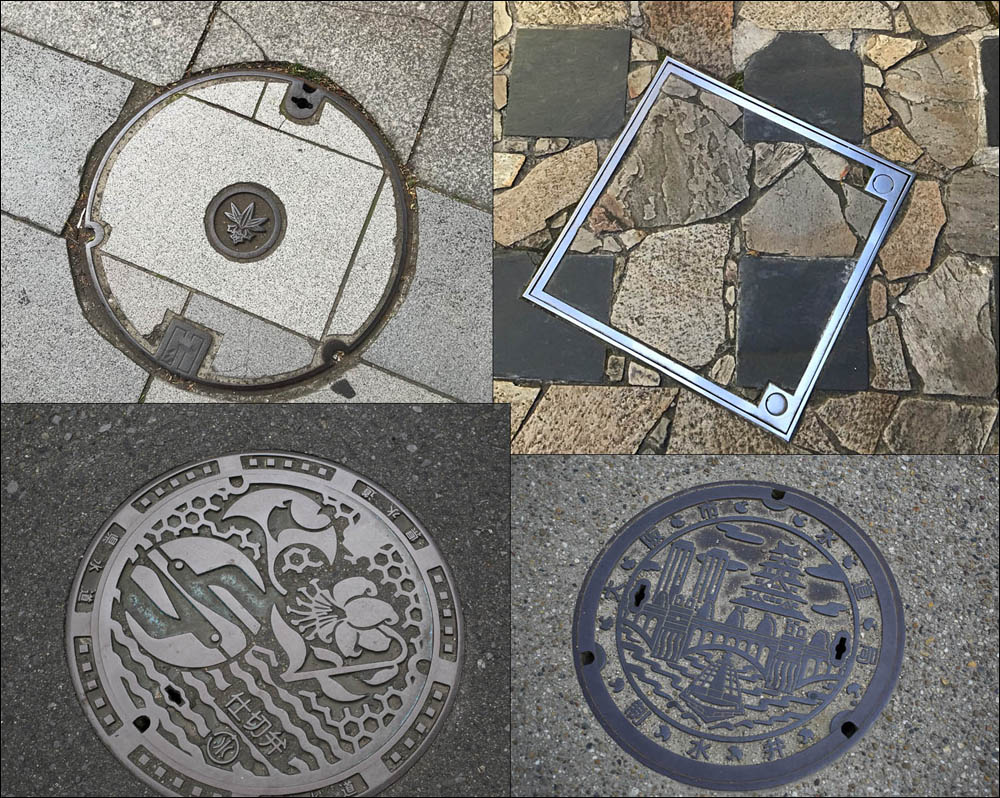
And these are hatches. They are beautiful or disguised.
City Features
It seemed to me that there was not enough space in Japan, and there they were fighting for every piece of land. But no. The first glance at the rice fields proved the opposite. There are mountains, untouched forests. That is a lot of places. But precisely because of the mountains, the most convenient places to live are bays. The population is distributed along the edges of the islands, and most of all people in Tokyo. Here there is a high population and building density.
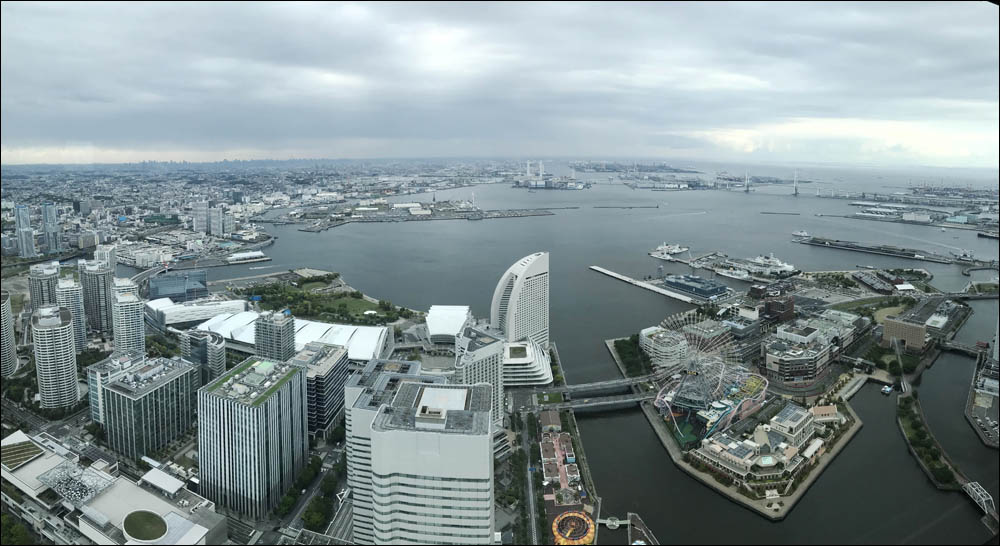
If in Shanghai there were four-story interchanges and two-story roads, then feel free to add a floor. Two is better.
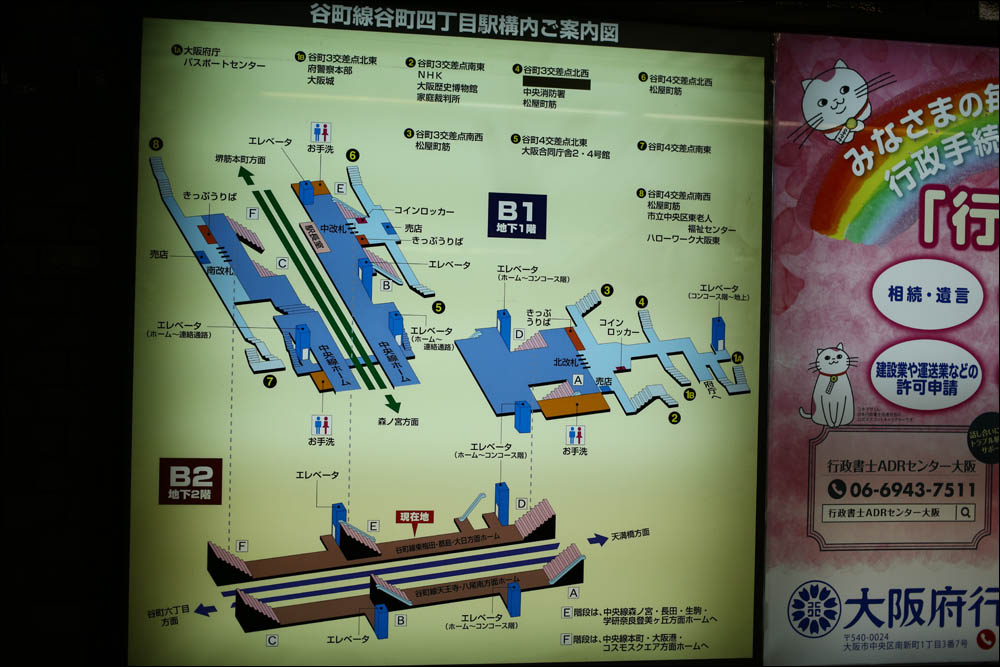
Without such a scheme, the metro station gets lost as a nefig to do, because it is one of the smallest stations.
What they decided to sacrifice is cemeteries. They are very compact. Everything is cremated and clustered.
More production. Almost everything is outsourced:
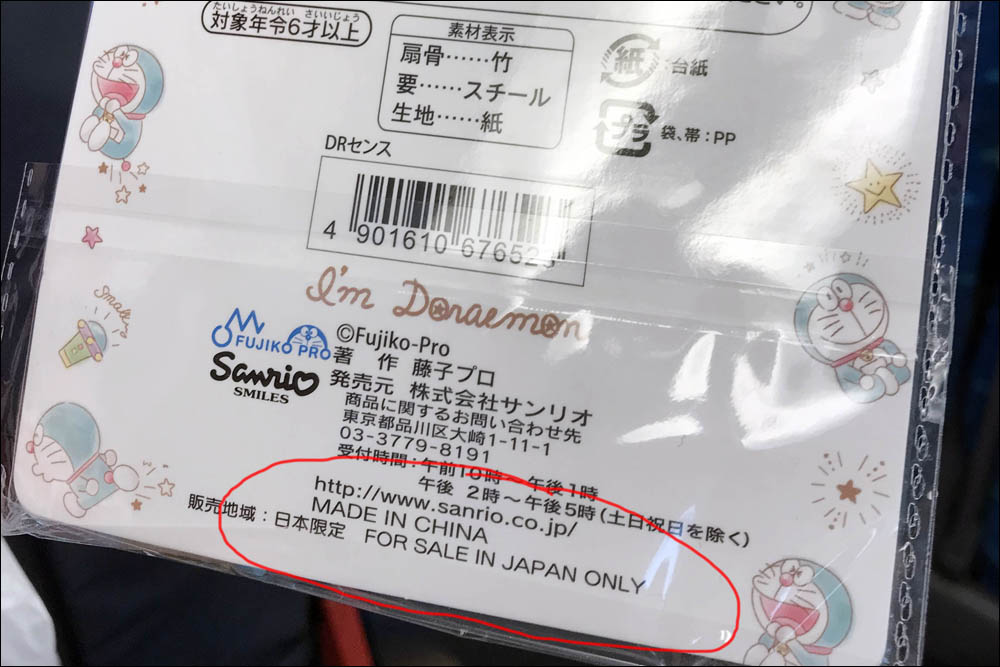
So look at how such a clearly empty place like a river is used. Why is it just flowing? Let's build a track over it. Or make a stage there for performances. Or let the restaurant be:

In fact, there are many crowds. Queues, a dense subway, attempts to squeeze even to the station in Vykhino (excuse me, on the Sinagawa) - this is all there.
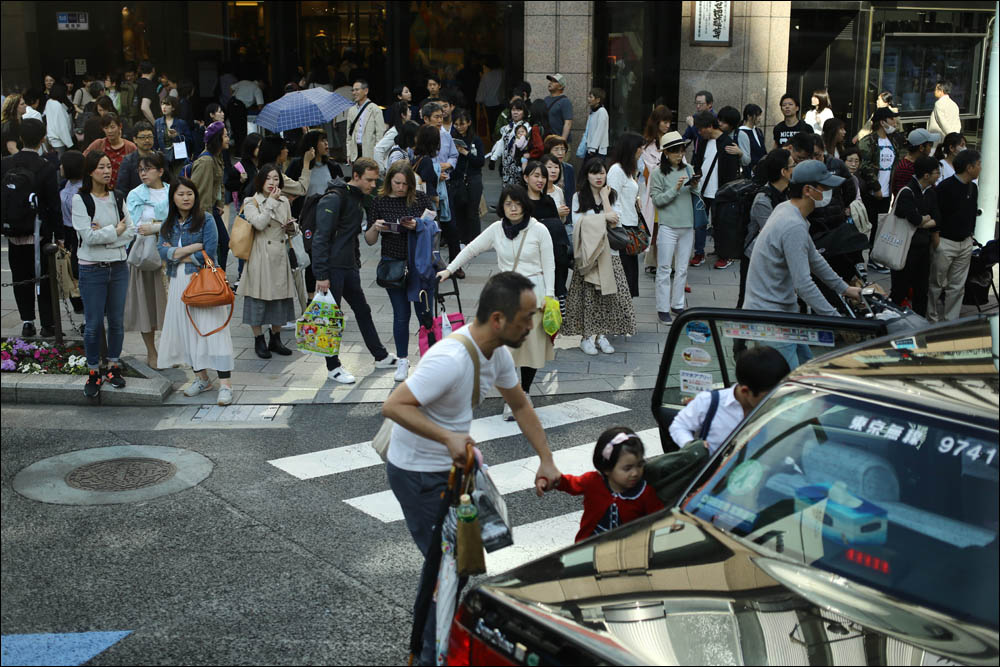

Specifically, there is such a crowd, perhaps due to the fact that I came to the holidays of the change of emperor, which happen a couple of times over a century.

Every time there were a lot of people around, I included a set of skills acquired in China. But this is the wrong set: you can’t touch anyone here and don’t have to follow your things. Because they do not steal. At all. Well, that is, there were such cases, but for someone to personally encounter - no. It’s absolutely normal for girls to lay out bags, phones and wallets on tables in the restaurant courtyard of the shopping center, take a bill and go pay for ice cream through the entire room. Or someone dropped a wallet, it lies on the street and waits for the owner:

In the evening, the store owner opposite him will take it to the police. If no one applies in 3 months, you can keep the money for yourself. It turned out that just watching things takes a lot of resources in Russia. No paranoia about personal safety is happiness.
By the way, tickets to museums and other places do not spoil. Because most often you can re-enter. It would probably have occurred to someone else to give their ticket to someone else, but if you break the law, it’s a shame for life.
The next thing that catches your eye - a lot of people wear respirators. From ordinary gauze dressings to curly masks.

Why? Conveniently. Protects from the sun. From allergies. Anonymously. Apparently, for the same reason, they almost never use credit cards (or culturally determined) - in general, I also hardly use them, so everything is familiar.
Japanese reinforced concrete follow the rules. They themselves form the queues at the stops and stand in them. It is law-abiding in half with politeness.
Judging by the severity of laws regarding the possibility of obtaining a SIM card, the state is actively monitoring your movements through the cellular network. Buying a SIM card for a foreigner is a difficult quest. It is much easier to rent (at the airport they give a 10-day rental right away without documents).

Solar panels are almost everywhere. From private, you can unload electricity back to the public network.
Separately, it is worth noting the toilets. As you might already guess, Japanese toilets are very cold, like everywhere else at home. But everywhere at home the Japanese walks in outerwear, and then he freezes his ass. Therefore, when the first toilet bowls were brought in, the engineers immediately provided them with heating. And if there is already an electrician there, then you can finish off the rest - an analogue of a drinking fountain instead of toilet paper and more functions so that the toilet control panel resembles a spaceship control panel.
Yes, the bathroom and toilet are sold by the module and are simply inserted into the house such as how we put the showers. And in Japan, a cabin is immediately a container with a room and all communications in the walls, furniture and more. It remains only to supply water and food, everything else is already inside. Including a container for soap and shampoo, if you ordered.
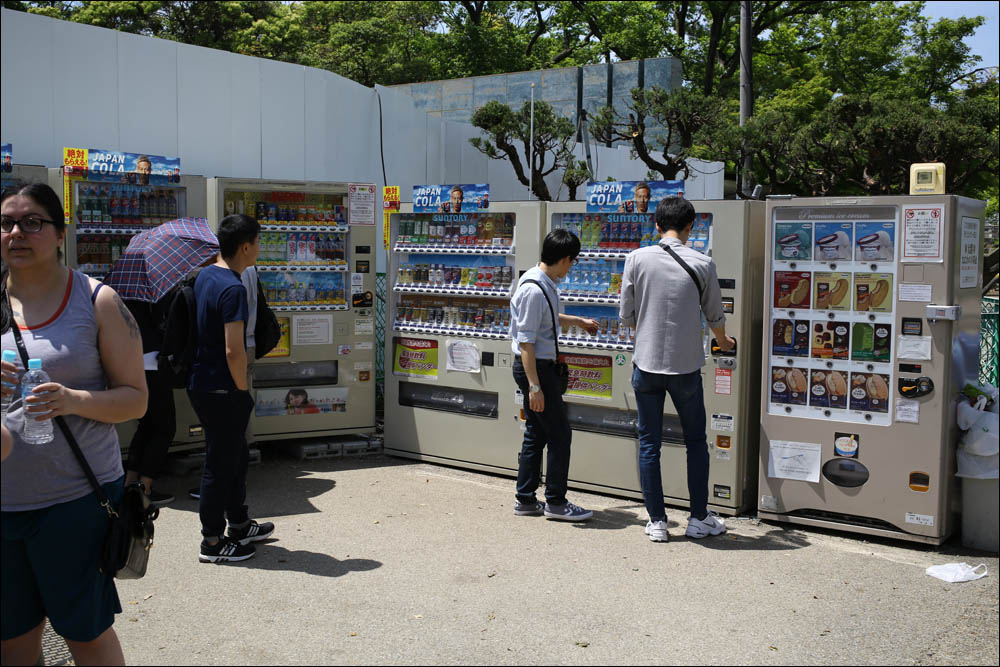
These are automata. They love them here, they sell a lot of things. By the way, an important point is that in vending machines and in stores, prices differ slightly. Even in tourist places. Even in a clean area of the airport.
Japanese society is now very old. Right very, as far as other countries have never gone before. Because a very high average life expectancy, and the elderly, who should have already stopped receiving a pension, are still cheerful and cheerful. Here are the WHO statistics for the Russian Federation - men under 66 live, women under 77. Japan report: Add 15 years to each boy and 10 to each girl. However, I would not say that they are directly fans of medicine. Just done on time. They eat without fanaticism. Without vaccination, they will not be taken to school, before and after classes, schoolchildren always have sports, after 40 they send regular subpoenas from hospitals “undergo a preventive examination”, very expensive medicine (but insurance is an important part of the work contract). Many helipads for ambulances. The way, the ambulance does not speak "uaaau-uaaaau" and "uaaau-uaaaau, please give way, thanks in advance." Because politeness. And everyone else is inferior, because that is the rule. But it was important to be asked.
Mirn left a comment with a description of the physical examination here.
Of the last things, this one struck menews about old people who volunteer for the Fukushima liquidators. There is not sacrifice, but ordinary rationalism. The grandfather of 72 years confidently reports: they say he is already old, life is left according to the expectation of 13 to 15 years, and cancer develops in 20-30. Therefore, even if you manage to grab a dose, it does not really matter.
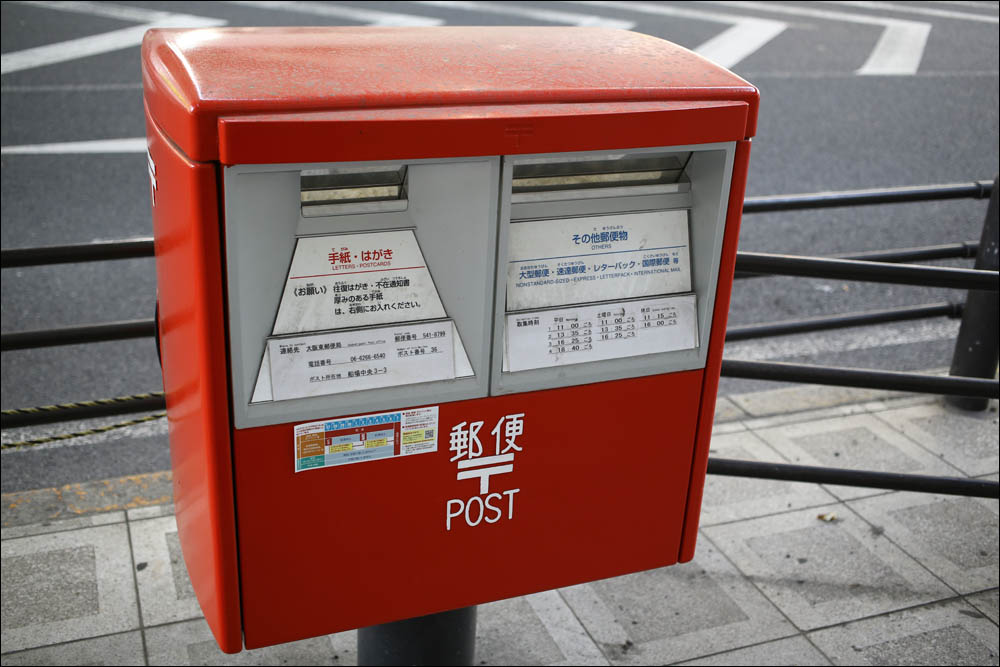
Mail is holy! Of all the postcards sent from all over the world, it was the Japanese who reached the fastest.
Food
It scared me the most. Raw fish. It turns out that if you do not know that this fish is raw, then that's okay. Yummy.
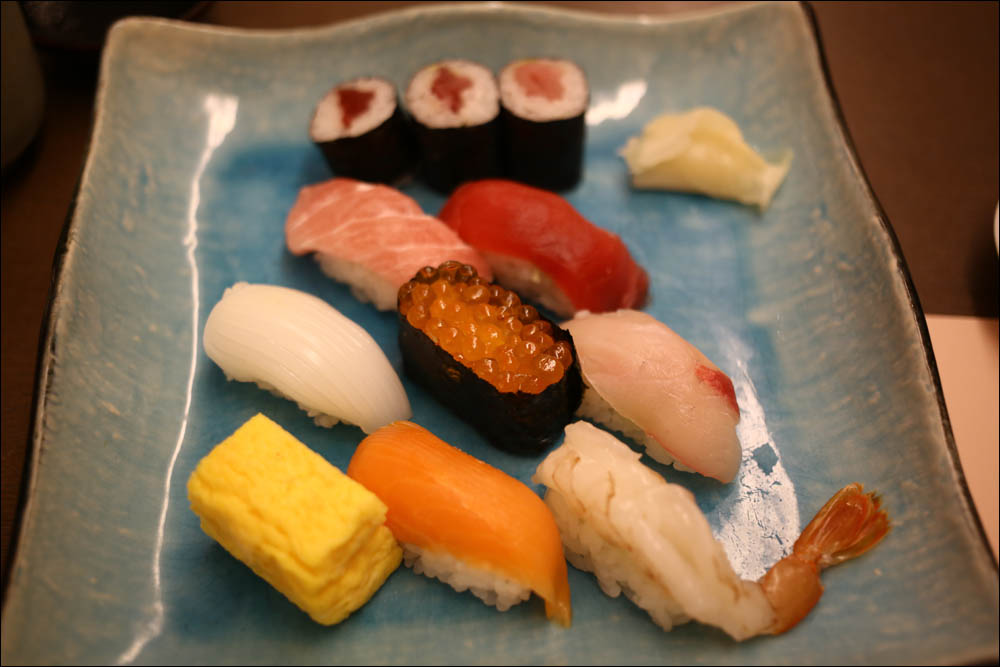
On the third day, familiar things appear everywhere. Here’s an omelet:
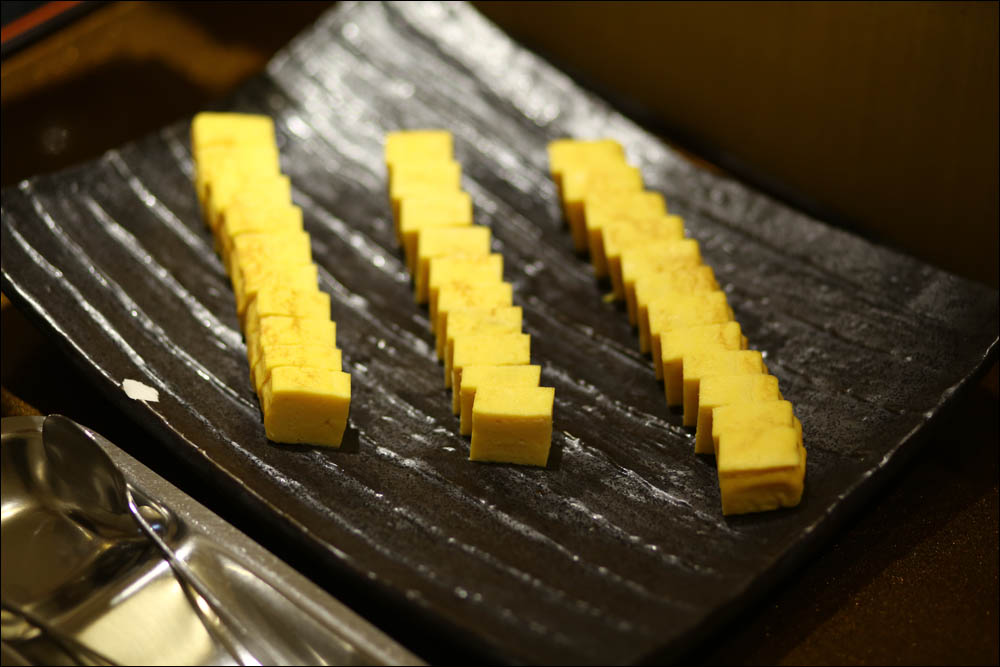
Here’s a steak (and don’t say that it is not in Japan!):

Here are business lunches:
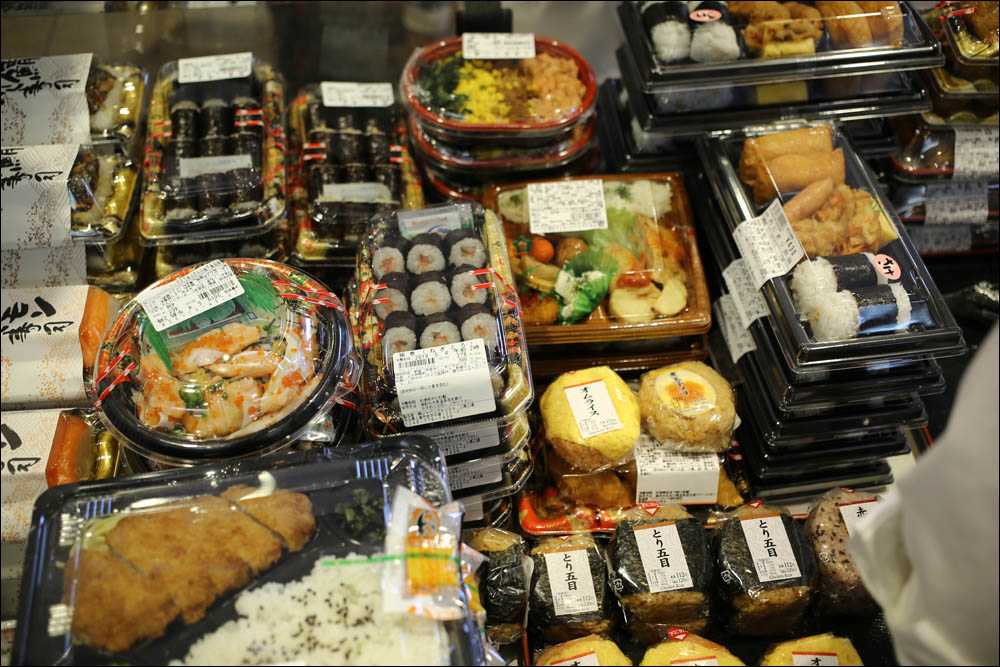
And here are sweets:
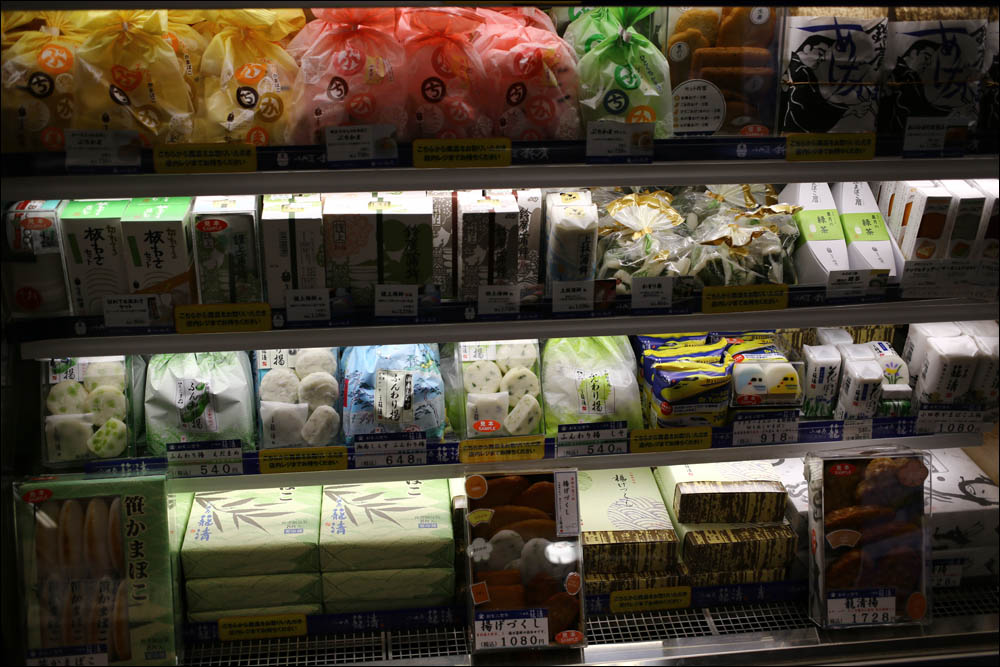
By the way, sweets are not real. Demo samples in polymer display cases. Like food samples in restaurant windows. There are even specialty fake food stores. Here is one in my channel .
Personal life
On average, the Japanese are very sociable and friendly, but only in a given cultural environment. Here's a simple sketch for you: I sat on the outskirts of the city in a bar with simple hard workers. We met very quickly even without knowledge of common languages, and then began to show pictures to each other from phones. So, the five people next to me in the phones were extremely empty. Only their ship. Vessel. Again the ship. Holiday on the ship. A seagull with a tag flew over. Vessel. Bridge. Repairs. Vessel. And so 10 years. Before that, there were simply no phones. Another one has the same picture with aircraft dousing. By the way, when I showed him with my fingers that type-3 nafig de-icing fluid is not needed by normal people, he was happy as a child and even touched with approval. They broke on Mayko. More precisely, on maiko-san (a student of a geisha). Serious and straightened missing ties.
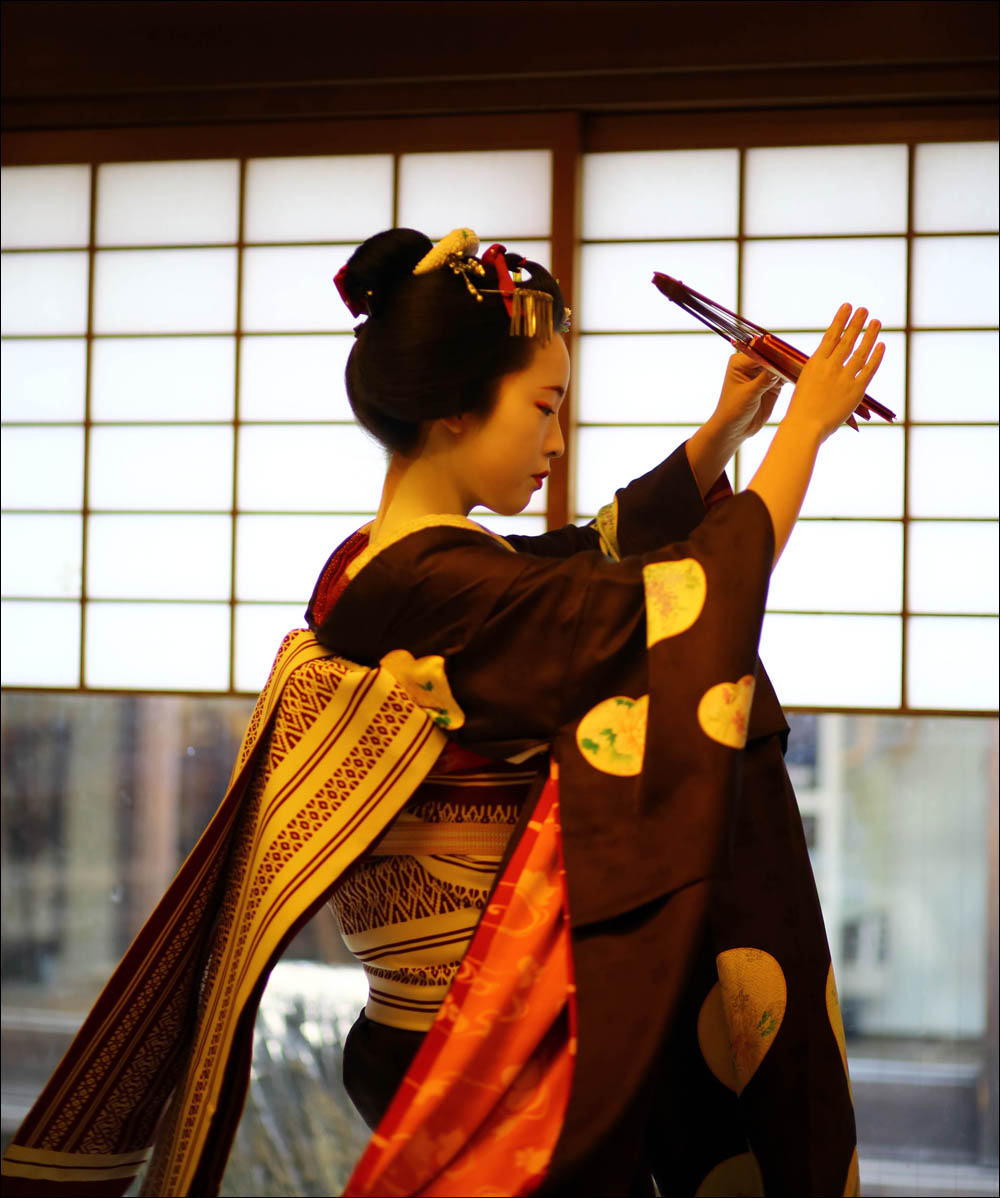
Maiko from the emergency service type, only arrives to talk. He knows how to assent, knows art, it is stated that he can support a conversation on any topic. Unfortunately, he knows nothing about the ideology of open source code. Not for any. But during the training she is deprived of the phone, and she writes paper letters to her family.
In 2009, mcgregor wroteabout what the Japanese office looks like. All the stereotypes about processing and stuff there are true, but with the understanding that everything is already being rebuilt in a Western way. So, this period was an economic breakthrough, something like a five-year plan, which is necessary in four years. Now there is also processing, but people often just go stupid in the office. Therefore, the new technology is to de-energize the building at 20:00. For example. The story of a career in one company is also blurred: some companies adhere to it, and some no longer. And they are ready to take the “traitors” who left their old clan. But the university can still own the infrastructure from kindergarten to prepare future students. The mentoring institute also works: Senpai at work may be younger than you. And the school is only a year older.
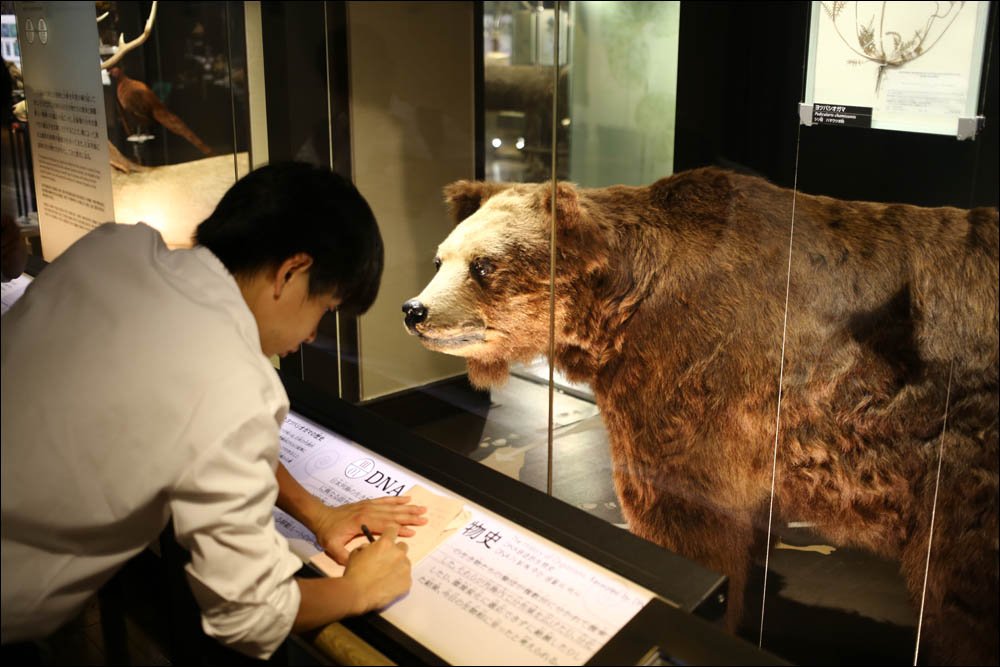
The first time I saw schoolchildren who came in a crowd to a museum and were recording everything.
There are hickeys who sit at home. It seems that there are up to 7% of the population (unconfirmed data). Just because to hell with her, social life.
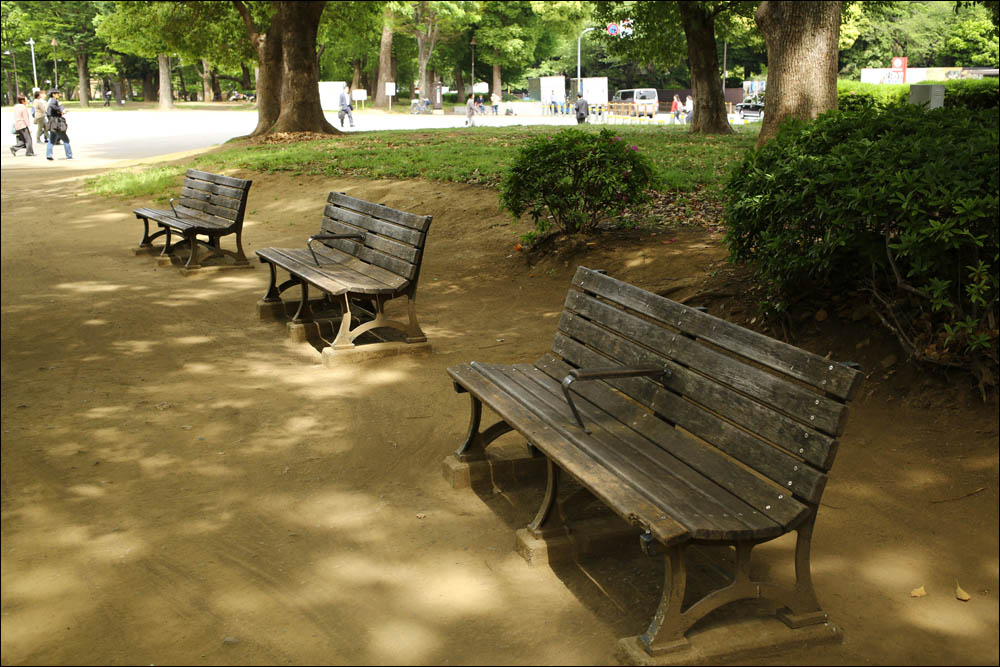
Japanese women usually end their careers in childbirth. Then there is a complicated scheme where it can work 4 hours a day and not get to the local personal income tax, and the husband receives pension benefits for this. If the spouse dies, by the way, the spouse continues to receive his pension. What I like most is that it has become fashionable to improve during such a sitting at home with a child - to study art and educate a husband, for example.
The rules of courtesy and the structure of upbringing-education do not allow just getting to know each other on the streets. In general, the only more or less free social action is a concert. There is much to be done. The rest of the time you have to keep a line.
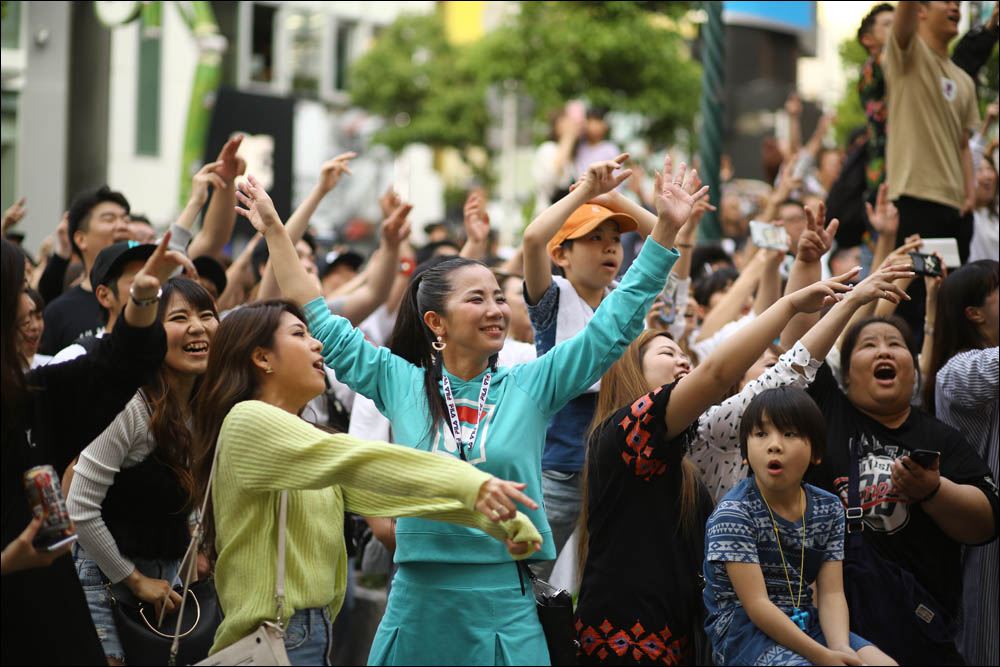
Given that the classes are mixed every year, it is assumed that you will have enough acquaintances at the exit from school. In practice, it may turn out that you do not really get to know anyone.
26 percent of Japanese under 34 are still virgins. There is no shame on the body, but there is a fear of approaching a person of the opposite sex.
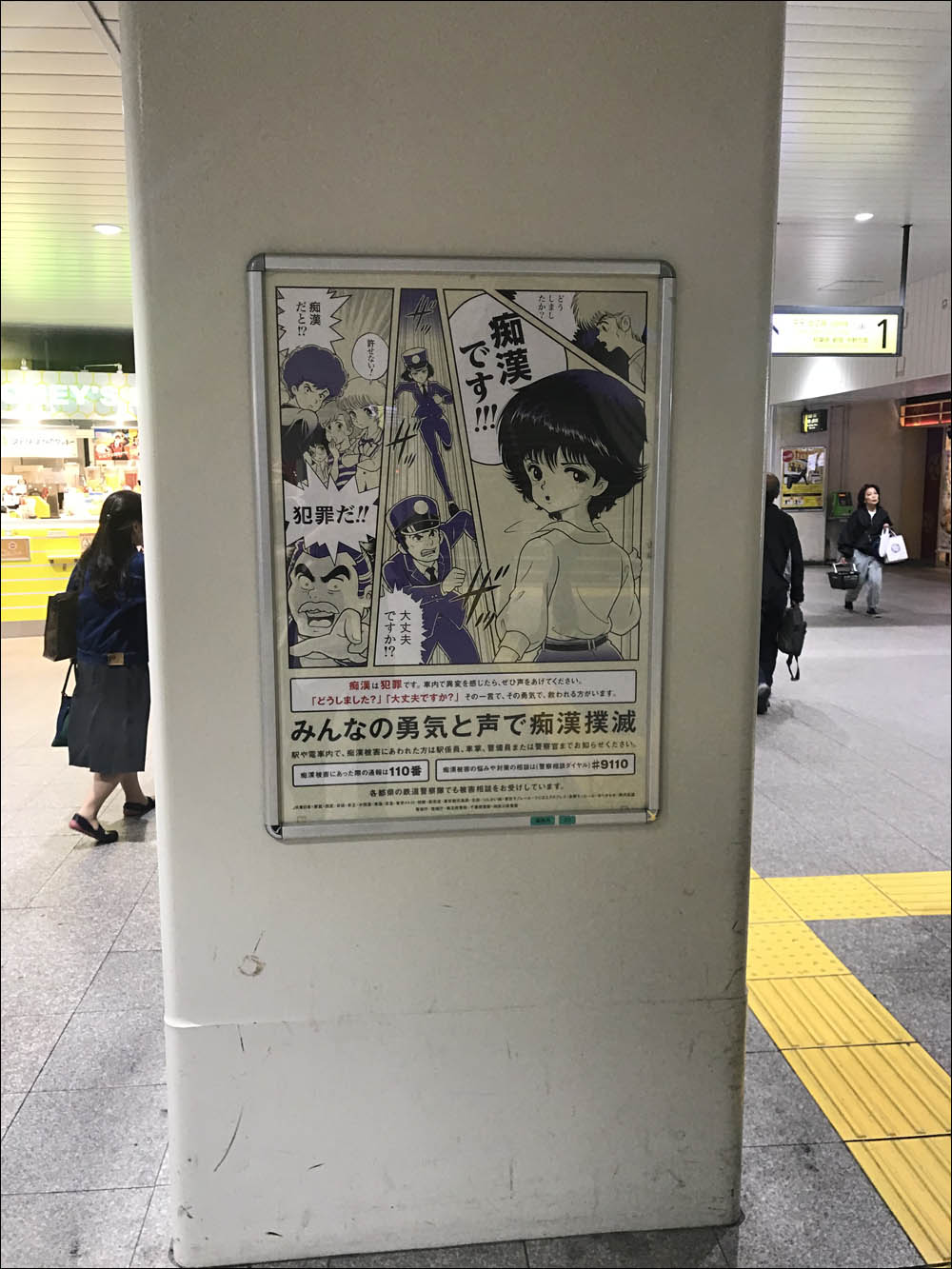
“With a loud cry and courage we will defeat perverts in the subway!”
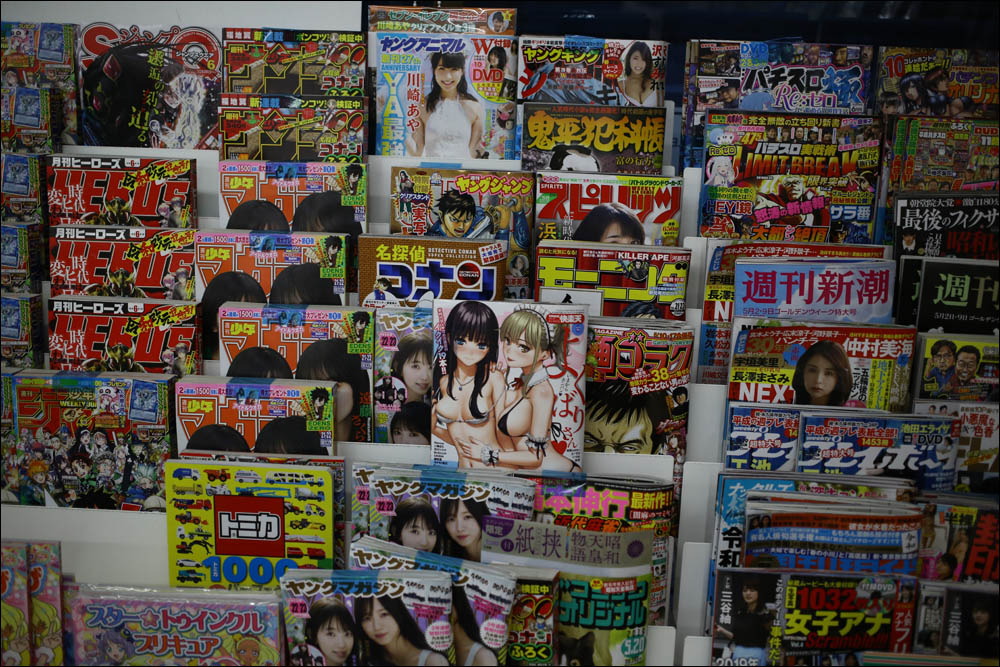
Logically
there are Homeless people. This is how they live:

At the same time, they wash themselves and lead a Diogenous lifestyle. For the whole metropolis there are a couple of thousand, and almost all are ideological.
From talking with our expats and local fixers, I roughly understood that we were scary-looking, but rather open-minded people for them. We squint a lot, we don’t understand obvious things, but when communicating we suddenly find ourselves a little more universal than they expected. Because (again, my impression) all Japanese are very, very, very focused on their field. That is, if on the Azores a resident of one island knew almost nothing about the other, then the same thing applies to some basic things. At the same time, they learn very quickly, if necessary - this was proved by the history when advanced technology was made from a lagging country.
When drunk, they keep friendliness and joy. So this is not hypocrisy, as it may seem. But there is not much “loyalty” to a friend here either: if it is advantageous to substitute, they will substitute. Again, according to expats. What is the reason for this - I can’t say for sure.
The most interesting thing is that society is still almost clanish (the work is “we”, there is no “I”), but each of the Japanese is an individualist. It’s like a flock of birds, where each keeps a clear distance from the others, but everyone does the same. It starts with school, I guess. Even as they go there in a crowded manner, a column of students gathers throughout the area. Seniors go front and back, juniors in the middle. It's scary to break away and go alone.
Slides
Buildings and crowds:

When a living person’s work is expensive (and it’s very expensive here), automation is used. This shaitan machine carries trays around the restaurant:
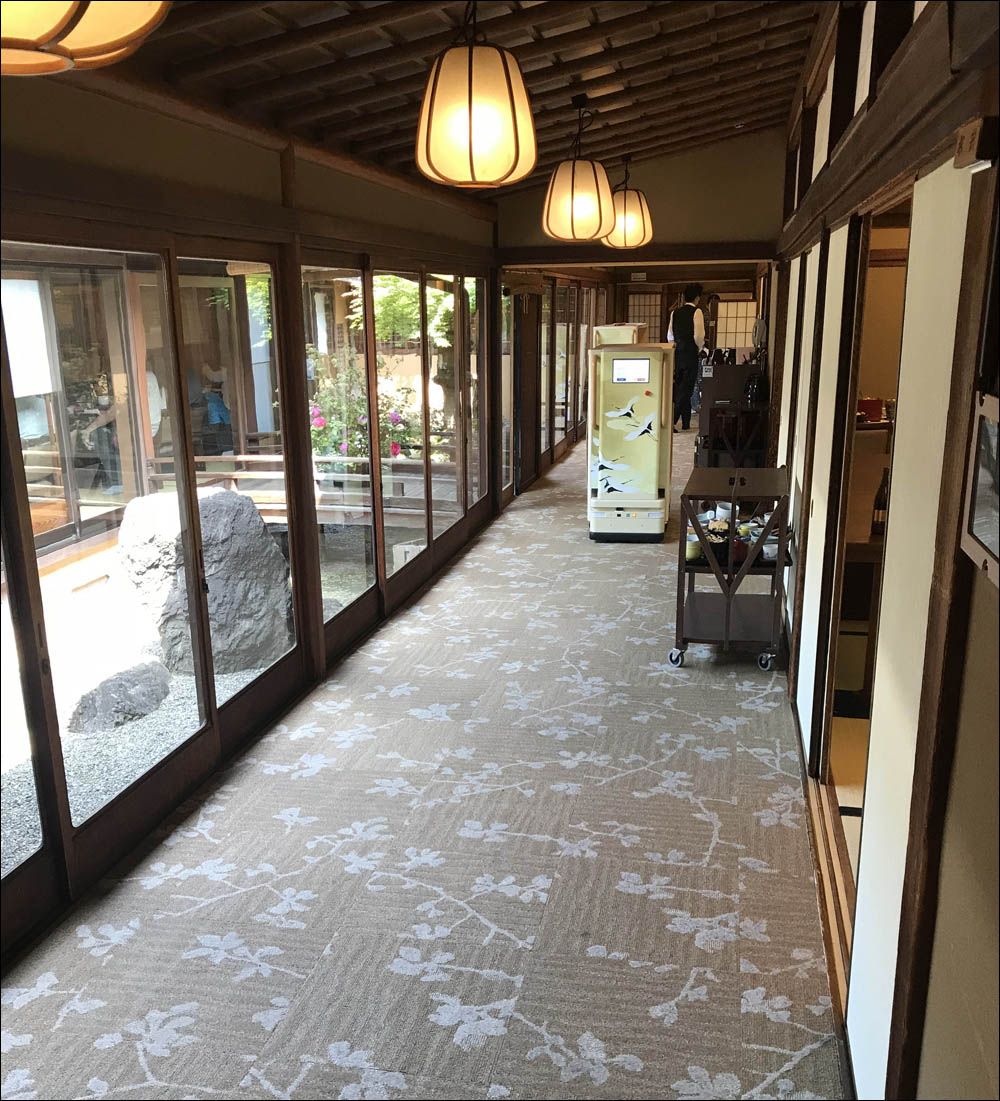
An engineer is equipped with everything you need, to come without a tool is an unheard-of thing: A

mess of wires:
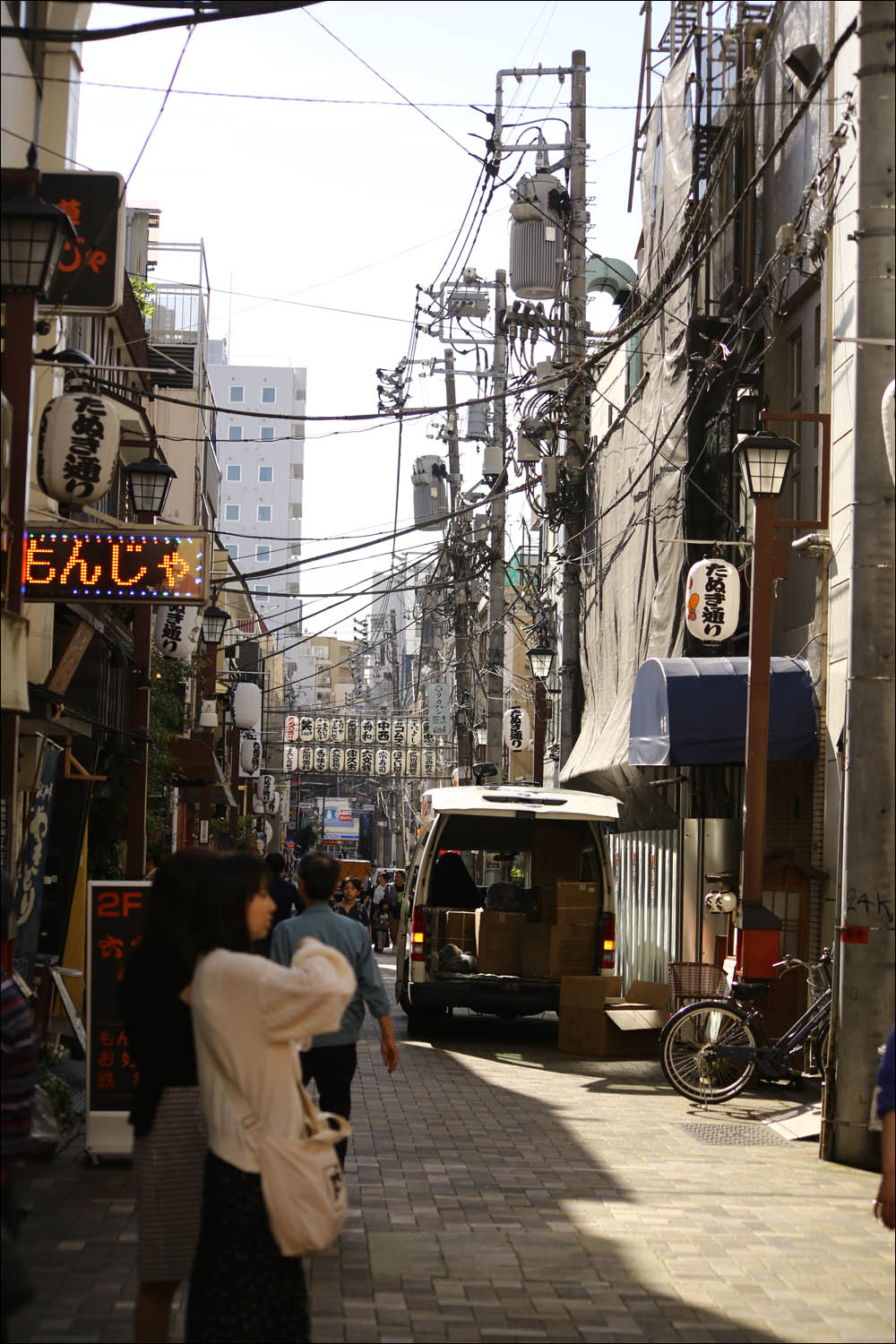
Fuji-san, of course:

You can buy a sheet of paper from which to squeeze and glue like this : A
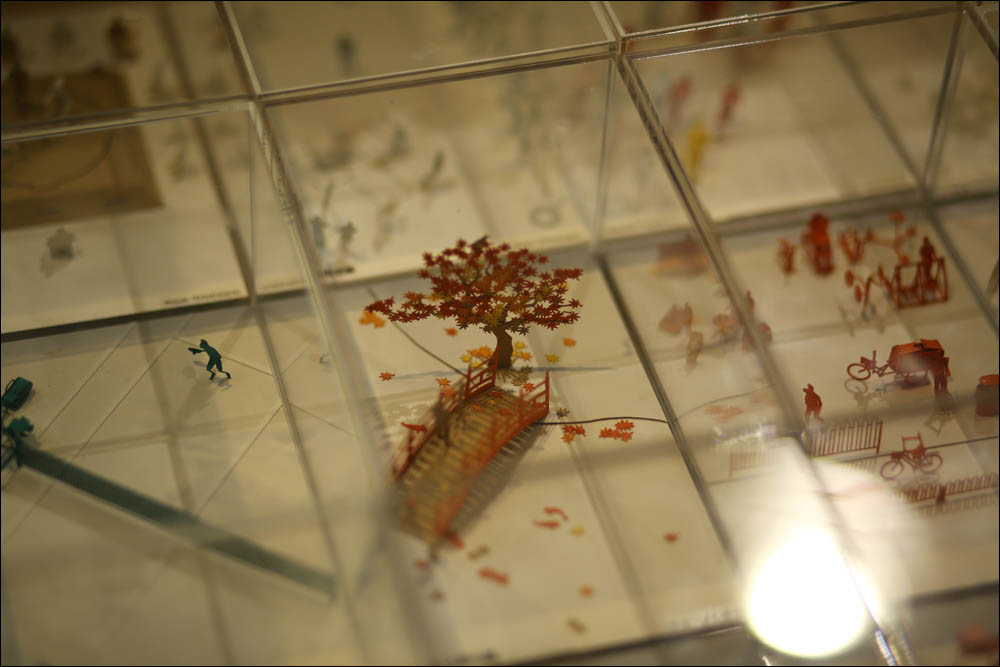
lady lured a cat for 2 hours to take off. And this is just what I saw:

Navigation on paving slabs corresponds to reality:
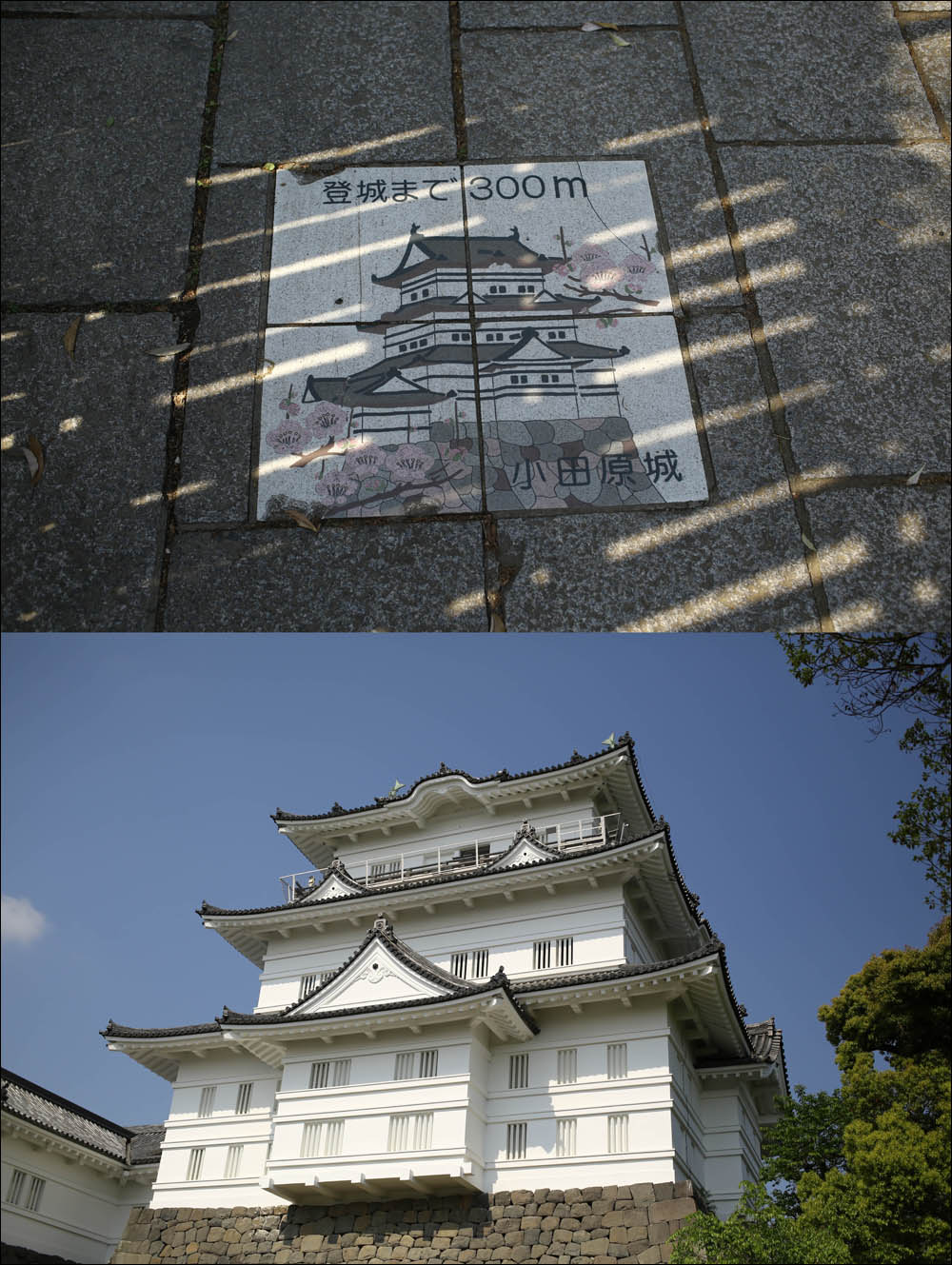
You can ride such a train: fast and expensive. In 2017, one of these trains left 20 seconds ahead of schedule, after which the carrier apologized on television.
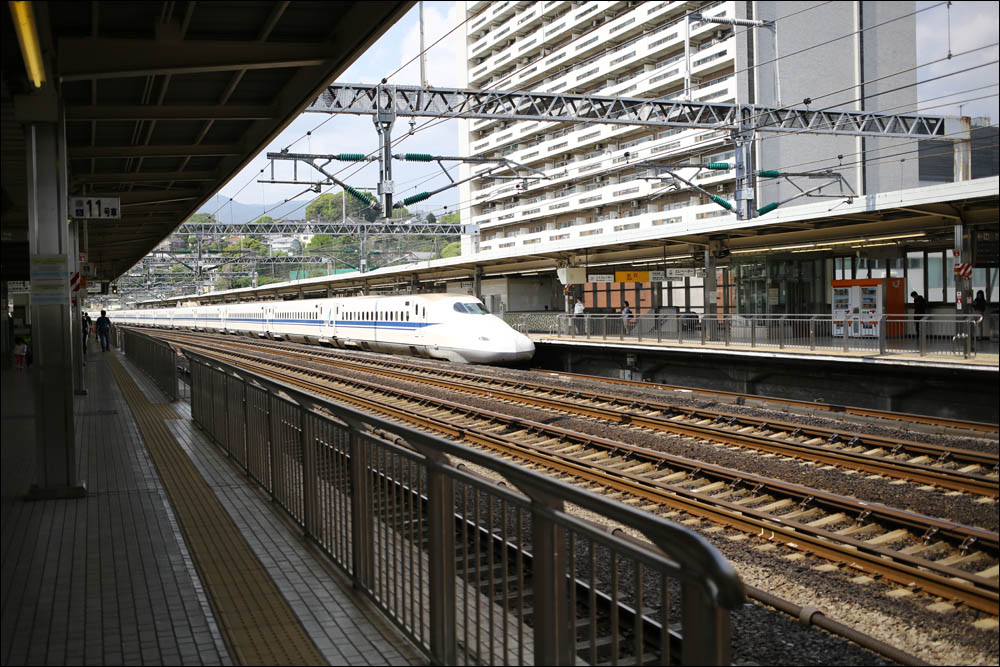
Religion: Shinto for good things, Buddhism when you have current problems, Christianity for marriage.
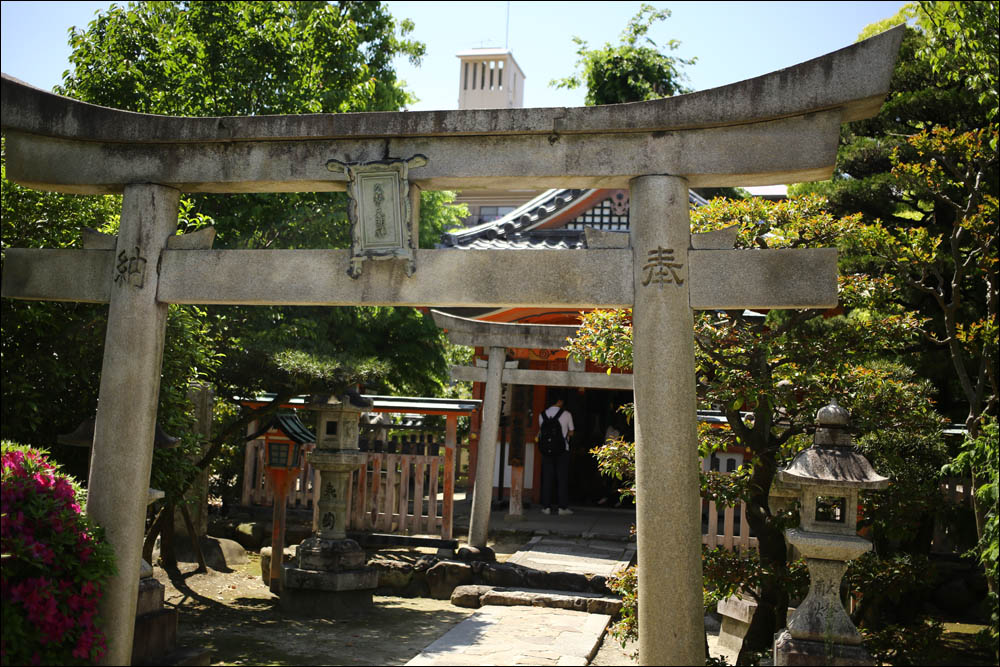
With all the aesthetics on sales, the hell is the same as ours:

And here is the aesthetics:
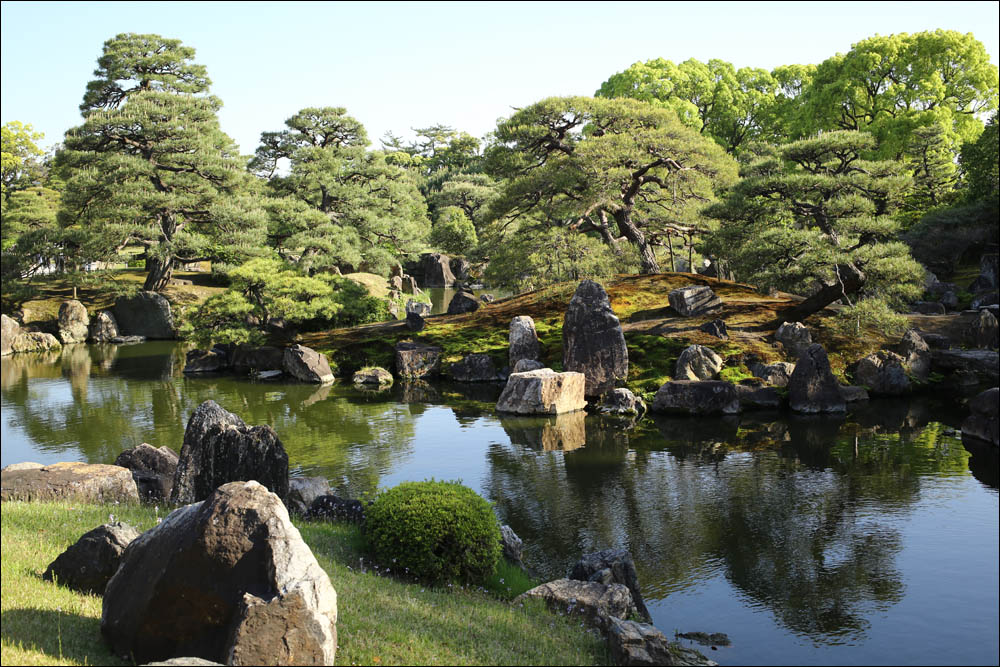
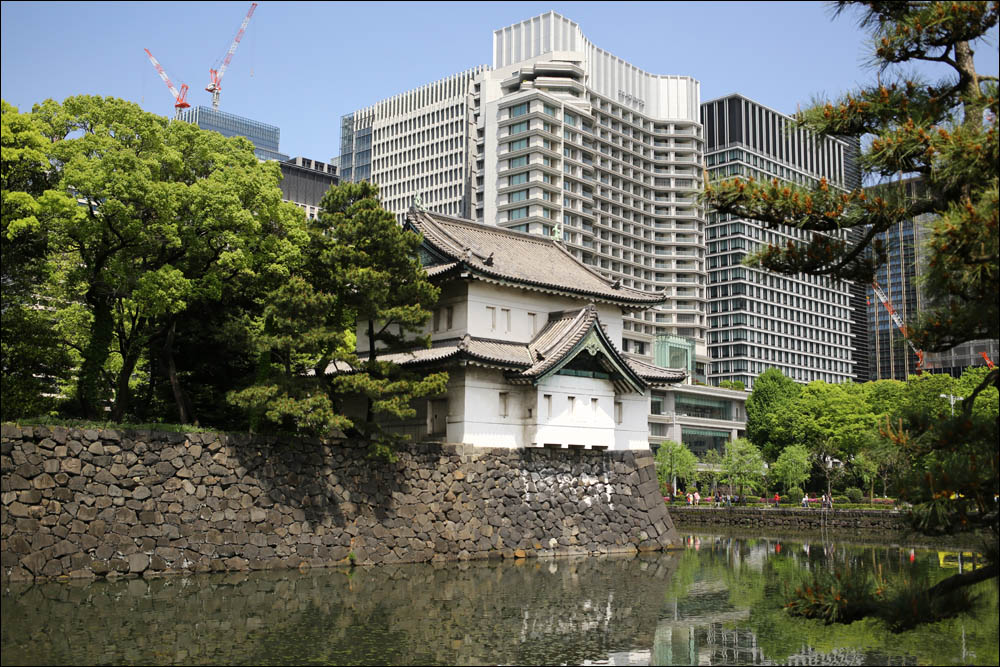
One of the few cats. Keeping them expensive:

In general, a very strange country. The fact that half of the time it seemed to me that I had not left Russia anywhere (only for some reason the future was around), and then from time to time I came across things that are not in our time. But everything was extremely logical. If you think cynically enough, of course, and in some places you are ready to move away from the usual morality.
